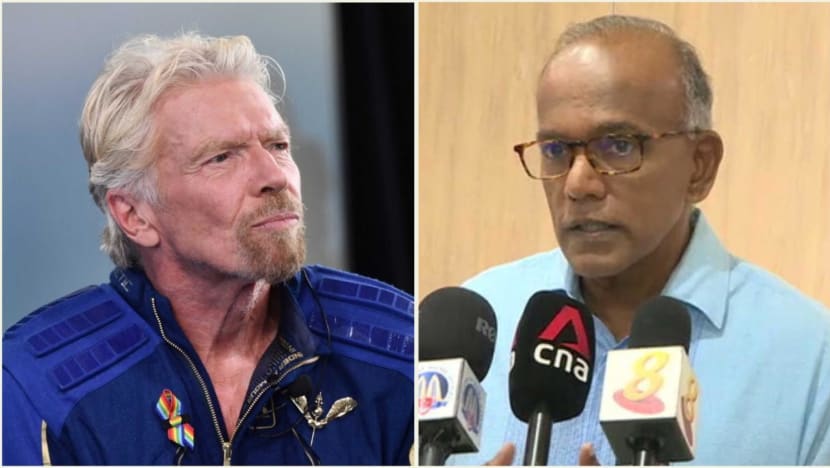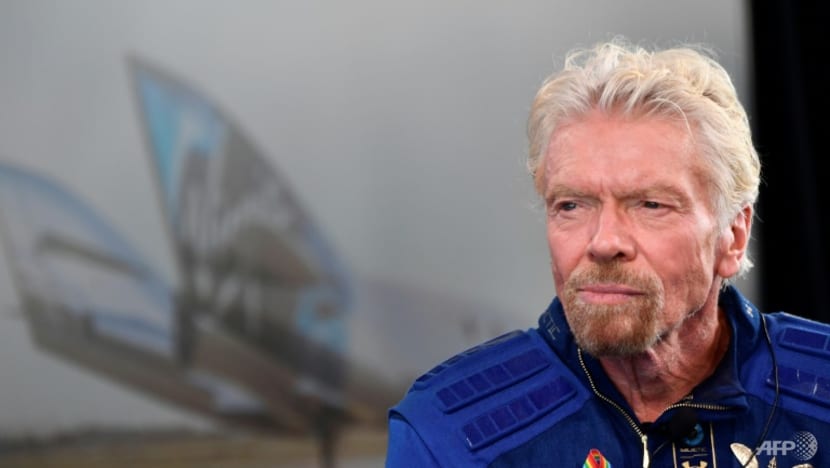 |
| A composite photo showing British billionaire Richard Branson and Singapore Home Affairs Minister K Shanmugam. (Photos: AFP, CNA) |
31 Oct 2022
SINGAPORE: British billionaire Richard Branson declined the Ministry of Home Affairs’ (MHA) invitation to a debate on Singapore’s approach towards drugs and the death penalty, saying the conversation “needs local voices” and that a television debate “cannot do the complexity of the death penalty any service”.
[He then proceeded to make his statement without rebuttal.]
In an open letter posted on his blog on Monday (Oct 31), Mr Branson said that such a debate “reduces nuanced discourse to soundbites, turns serious debate into spectacle” and urged the ministry to engage stakeholders such as advocates, lawyers and journalists.
“Abolition is not, as some argue, a Western concept imposed on the rest of the world,” he added. “This is about universal human rights and humanity’s shared aspiration to advance equality, justice, dignity, and freedom everywhere, for everyone.”
He also expressed “enormous respect for Singapore and Singaporeans and for everything your country has achieved over the last decades” in his letter, which was addressed to Singapore’s Home Affairs Minister K Shanmugam.
“It is because of this respect that I feel compelled to speak out when I see things go as horribly wrong as Singapore’s use of the death penalty,” he said.
[So what is "horribly wrong" about Singapore's use of the death penalty and drug policy? Oh right! He doesn't want to debate.]
“And I am not a lone voice raising this. There are many Singaporeans, including lawyers, human rights defenders, civil society organisations, and others, who have consistently expressed the same concerns.”
Mr Branson also said that imposing the death penalty for drug offences is a “disproportionate and ineffective” response to the problem.
He noted that Singapore “remains among a very small group of countries” that continue to apply the death penalty at scale, as well as one of the few that does so for drug offences.
Mr Branson has been vocal in his views against Singapore's death penalty for crimes such as drug trafficking, and spoke out against the execution of convicted drug trafficker Nagaenthran Dharmalingam earlier this year.
“As you may know, I am part of the Global Commission on Drug Policy, a group of global leaders advocating for lasting reform, including many respected former heads of state and government,” he said.
[When govt asks business leaders/private citizens for their inputs on solving a socio-criminal problem, it suggests (strongly) that the govt has no answer to these problems, and has fobbed off the question to the public, washing their hands of the problem. So, has this Global Commission on Drug Policy managed to reduced the problem of drugs, or did they choose to critique a country with low drug abuse for their effective drug policies?]
“We have studied the failed war on drugs for the last 15 years, and with one voice, we urge governments to treat drug use as a health issue, and to stop the needless and ineffective criminalisation of people.
“We have studied the failed war on drugs for the last 15 years, and with one voice, we urge governments to treat drug use as a health issue, and to stop the needless and ineffective criminalisation of people.
[Yes, the "War on drugs" is a failure. In the US and in the the West. So we should fail too?]
“The members of the Commission travel the world to engage governments and other stakeholders in constructive dialogue, and I think you should welcome this form of dialogue.”
“The members of the Commission travel the world to engage governments and other stakeholders in constructive dialogue, and I think you should welcome this form of dialogue.”
[So you okay with "dialogue", but not okay with "debate"? Such.... hypocrisy.]
On the ministry’s invitation, Mr Branson said a televised debate with its limited time and scope is “always at risk of prioritising personalities over issues”, and thus “cannot do the complexity of the death penalty any service”.
“It reduces nuanced discourse to soundbites, turns serious debate into spectacle. I can’t imagine that is what you are looking for,” he said.
On the ministry’s invitation, Mr Branson said a televised debate with its limited time and scope is “always at risk of prioritising personalities over issues”, and thus “cannot do the complexity of the death penalty any service”.
“It reduces nuanced discourse to soundbites, turns serious debate into spectacle. I can’t imagine that is what you are looking for,” he said.
[As opposed to.... what Branson has been writing on his blog, and in this letter?]
“What Singapore really needs is a constructive, lasting dialogue involving multiple stakeholders, and a true commitment to transparency and evidence.”
He added that while he will continue to advocate for the abolition of the death penalty and raise the issue “wherever (he) can”, the conversation “needs local voices”.
“In Singapore’s case, we have been inspired by several people and organisations - advocates, lawyers, journalists - with experience, knowledge and data,” he said.
“The brave thing for you would be to actively engage those Singaporean stakeholders, from Transformative Justice Collective to Mr M Ravi, Nagaenthran Dharmalingam’s courageous lawyer, and regional voices, such as the Anti-Death Penalty Asia Network, and treat them as equals who are just as interested in Singapore’s progress as I’m sure you are.
“They deserve to be listened to, not ignored, or worse yet, harassed.”
He said he would be “absolutely delighted and will celebrate with (Singapore)” should the country decide to abolish the death penalty.
“I hope you … will eventually realise that it’s an inhumane, brutal practice that does not save lives - and casts a dark shadow on Singapore’s reputation in the world.
“There is no evidence to support its continued existence. Just ask those in Singapore who know.”
CNA has asked MHA for comment.
“What Singapore really needs is a constructive, lasting dialogue involving multiple stakeholders, and a true commitment to transparency and evidence.”
He added that while he will continue to advocate for the abolition of the death penalty and raise the issue “wherever (he) can”, the conversation “needs local voices”.
“In Singapore’s case, we have been inspired by several people and organisations - advocates, lawyers, journalists - with experience, knowledge and data,” he said.
“The brave thing for you would be to actively engage those Singaporean stakeholders, from Transformative Justice Collective to Mr M Ravi, Nagaenthran Dharmalingam’s courageous lawyer, and regional voices, such as the Anti-Death Penalty Asia Network, and treat them as equals who are just as interested in Singapore’s progress as I’m sure you are.
“They deserve to be listened to, not ignored, or worse yet, harassed.”
He said he would be “absolutely delighted and will celebrate with (Singapore)” should the country decide to abolish the death penalty.
“I hope you … will eventually realise that it’s an inhumane, brutal practice that does not save lives - and casts a dark shadow on Singapore’s reputation in the world.
“There is no evidence to support its continued existence. Just ask those in Singapore who know.”
CNA has asked MHA for comment.
Source: CNA/ga(ac)
[Branson weasels out of debate. What is it with Billionaires and their inflated egos and over-developed sense of entitlement. Wealth does not equate to weight of opinions. Or maybe it does...]
Richard Branson invited to debate with Shanmugam on Singapore’s anti-drugs policy, death penalty
The British billionaire, who has spoken against Singapore's death penalty, made false assertions in a recent blog post, says the Home Affairs Ministry as it invited him to a live televised debate. |
| File photo of British billionaire Richard Branson. (Photo: AFP) |
22 Oct 2022
SINGAPORE: The Ministry of Home Affairs (MHA) said it has invited British billionaire Richard Branson to Singapore for a live televised debate with its minister K Shanmugam on the country's approach towards drugs and the death penalty.
Mr Branson has been vocal in his views against Singapore's death penalty for crimes such as drug trafficking, most recently in a blog post on Oct 10. Earlier this year, he spoke out against the execution of convicted drug trafficker Nagaenthran Dharmalingam.
In response to his blog post, MHA said in a media release on Saturday (Oct 22) that he made false assertions about alleged racial bias and the treatment of defence lawyers.
The ministry also reiterated Singapore's stance on drugs, saying that the capital sentence has had a clear deterrent effect on drug traffickers in Singapore.
"Our priority is to protect Singapore and Singaporeans from the scourge of drugs," said MHA. "We take a comprehensive harm prevention approach, which includes the use of the death penalty for traffickers who traffic large amounts of drugs and seek to profit from destroying other people’s lives and livelihoods."
In inviting Mr Branson to a debate on the issue, MHA said: "Mr Branson’s flight to and accommodation in Singapore will be paid for.
"Mr Branson may use this platform to demonstrate to Singaporeans the error of our ways and why Singapore should do away with laws that have kept our population safe from the global scourge of drug abuse."
In his blog post on Oct 10, Mr Branson said that Nagaenthran had a “well-documented intellectual disability” and was hanged despite that.
"We have clarified on several occasions that this is untrue. The Singapore Courts held that Nagaenthran knew what he was doing and that he was not intellectually disabled," MHA said on Saturday.
"Mr Branson also suggests that Singapore had breached our international commitments to protect people with disabilities by carrying out the capital punishment on Nagaenthran. This too is untrue, as Nagaenthran was not intellectually disabled."
Mr Branson also alluded to the suspicion of alleged racial bias and that those executed in recent times were small-scale drug traffickers.
"This assertion is false. Mr Branson probably picked it up from some activists in Singapore with their own agendas," the ministry said.
"Our laws and procedures apply equally to all, regardless of background, nationality, race, education level or financial status. Every person who faces a capital offence is accorded full due process under the law. Their trials are transparent and open to the public and media."
Defence lawyers have never been penalised for representing and defending accused people, said MHA in response to the businessman's claims of "harassment" of lawyers.
"However, this does not mean that lawyers can abuse the court process by filing late and patently unmeritorious applications to frustrate the carrying out of lawfully imposed sentences," the ministry said, pointing to Nagaenthran’s case.
"Mr Branson is entitled to his opinions," it added.
"These opinions may be widely held in the UK, but we do not accept that Mr Branson or others in the West are entitled to impose their values on other societies. Nor do we believe that a country that prosecuted two wars in China in the 19th century to force the Chinese to accept opium imports has any moral right to lecture Asians on drugs."
Singapore's policies on drugs and the death penalty derive from the country's own experience, said MHA, adding: "Nothing we have seen in the UK or in the West persuades us that adopting a permissive attitude towards drugs and a tolerant position on drug trafficking will increase human happiness.
"Where drug addiction is concerned, things have steadily worsened in the UK, while things have steadily improved in Singapore."
No comments:
Post a Comment